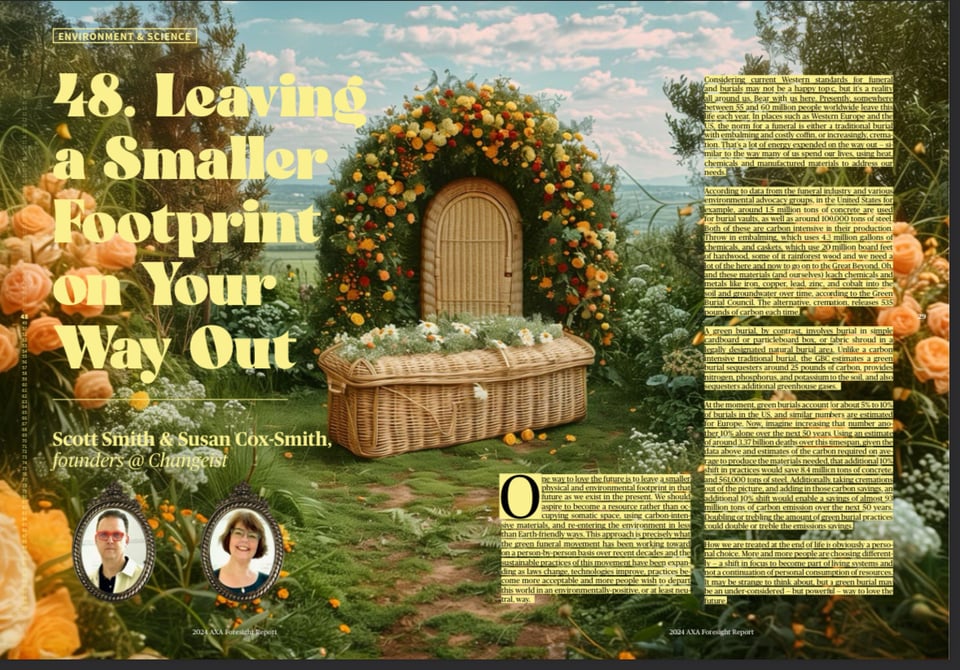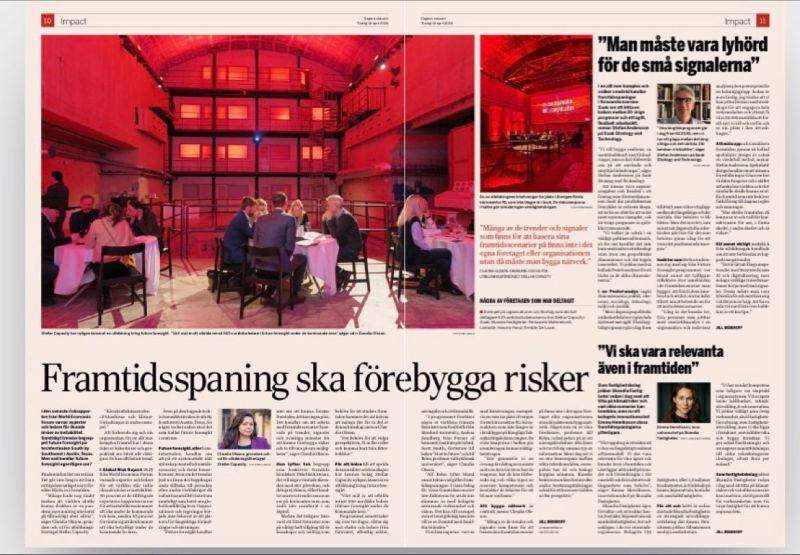Reporting from the Future
The exponential growth of AI. IPCC trajectories for climate change. Election scenarios. Falling birthrates. The Singularity. Colonizing Mars. Solarpunk. These topics represent a broad spectrum of headlines that might point to “The Future” from a generalist point of view.
But just pointing to something and declaring “This is the future!” is easy to do, but hard to validate. Reporting on these topics requires some insight about foresight, as well as a wider framework for gathering knowledge and expertise.
There is a knowledge gap around future-forward topics that can create obstacles for making complex information that many want to understand and make decisions about, more easily accessible. Reputable information about “The Future” often challenges journalists and ultimately the public, who rely on their reporting to make sense of potential future developments.
Without clear guidance, it's difficult for writers, editors, and reporters to navigate information about innovations, trends, and disruptions. It's equally tough to understand the work of forecasters, analysts, inventors, academics, entrepreneurs and futurists, not to mention their wildly various processes, methods and motivations.
Why does it matter? Because the stakes of understanding “The Future” and its impacts on all of us have never been higher. We’re all trying to decide what’s important, what's useful, what’s concerning, what’s harmful, what’s hopeful, and what might be desirable for someone else but maybe not for us, in large part based on what those we trust report to us. Without an incisive and effective media as a trusted sensemaker, participating in shaping a safer, better, and more equitable future becomes infinitely more difficult.
Futures for Journalists
So, we’ve decided to put our experience where the problem is and, in the spirit of what we like to think of as public-service futuring, put the tools and knowledge we have to use here. We’re taking what we’ve learned from 20 years of working with policy-makers, NGOs, media organizations and advocacy groups and created a dedicated workshop aimed at helping journalists, writers, editors, and communicators of all kinds to improve their skills at sorting out the messages, forecasts, promises and predictions they might uncover in the process of telling stories about the future.

What will you learn?
What we’re offering is an eight-hour online workshop across two days designed to bring journalists, editors, freelancers, and communication professionals the fundamental tools and approaches of the futures profession for coverage of emerging issues, long-range trends, and competing forecasts.
The workshop will:
Introduce participants to the "flavors" of futurists and forecasting
Provide clear definitions of key terminology and frameworks
Explain methods for signal and trend identification
Teach structured approaches to unpacking trends and exploring their impacts
Unpack what scenarios are and how to build them, and
Use these tools to structure narratives about the future that can be applied to researching, reporting, pitching and creating stories dealing with important future topics.
Sign me up!
Our first workshop will be May 16-17. You can register for Futures for Journalists, on Eventbrite, which will run online for two half days (eight hours total). We’re running this initial round online, for US time zones, but depending on the success, we may offer in-person versions elsewhere later this year (New York, London, Los Angeles, Berlin?). We are offering discounted registration to members of community media organizations (serving local, regional or cultural communities), non-profit media, and early career professionals (3 years or fewer). Get in touch if you are in these categories, and we can share discount codes with you.
For those in the journalism field, we realize this is a challenging time, and hope this workshop can be a tool not only to help sharpen your skills and raise your game, but also set you up to use the tools of futuring to better chart your own path through the turbulence.
Note: We can also design a workshop like this one for internal teams within media organizations or similar groups who want to sharpen their pens for a future full of challenges. Get in contact to discuss.
SuperSeminar Season 02
Between now and then, some other excitement! Scott will be a guest, along with Mercedes-Benz futurist Mike Milley, for the first SuperSeminar of Season 02: In the Enterprise.

In the words of SuperSeminar compère Julian Bleecker of Near Future Laboratory, this installment will be about foresight/strategy/futures work in the enterprise. What's the value within the organization? What are some lessons we’ve learned on how to get 'buy in' or make this work 'make sense' and contribute? We’ll be sharing some examples of our own work and approaches to these challenges, and offer practical experiences from the front lines.
Register here. Slots are very limited, and the audience is intimate to better enable rich interaction and Q&A.
Where We’ve Been
It’s been a busy start to the year for us, and we’ve already enjoyed spending time on both US coasts, in particular spending time with colleagues and friends in LA, and dropping into the Berggruen Institute to hear some fantastic talks about Embodiment & Intelligence organized by Claire Isabel Webb.
We also had the opportunity to speak to folks at IBM’s iX team, Buro Happold, and a few other organizations this past quarter. As always, drop a line if you’re looking for provocations, illuminations and capability building internally.
Here are some of the other things we’ve been up to that you may enjoy.
UNDP Futures Series
In the last newsletter, we mentioned that we had been featured on the UNDP Futures Series to talk Future Cultures. Now, video of that session is available, which you can check out in the media section of the book’s website.
While you’re there, you can enjoy our chats with Adrian Tennant for In Clear Focus, Julian Bleecker for Near Future Laboratory’s podcast, and, most recently, the Cohere Podcast with Dr Lauren Vargas and Bill Johnston, which we really enjoyed.
Give them all a listen! We rarely repeat ourselves 🙂
Speaking of UNDP, we also applaud the release of the 2024 UNDP Trend Report, which was enabled by the Future Trends and Signals System we at Changeist co-designed alongside strategic design practice Smithery Ltd, and the brilliant UNDP Strategy & Futures Team. This is the second public insights product to be released based on the knowledge collected in the FTSS, even as the platform has supported a diverse range of internal anticipation and strategy efforts around the world. We’re proud to have helped bring it to life.
100 Reasons to Love the Future
As a follow-up to an event last year in Paris, our friends at AXA magicked together a lovely collaborative publication, 100 Reasons to Love the Future. A gorgeous read, this compilation pulls together a dream team of futurists, creators, innovators, writers and thinkers to talk about their favorite reasons to love the future. We’re excited because we not only got a fab two-page spread, we also got to talk about the future no one discusses—the afterlife! Download and enjoy.

Stellar Capacity’s Foresight Program
Scott dropped in to present a session on experiential futures to participants in the inaugural foresight program offered by Sweden’s Stellar Capacity. It was a great session, made even better by this lovely mention in Swedish business paper Dagens Industri, along with the great cohort of visiting lecturers, including Paul Saffo, Alf Rehn and Anders Sandberg. Thanks to the SC team for the invitation.

What’s Next?
The road beckons again, after several upcoming workshops.
On 24 May, Scott will be speaking at Opendata.ch/2024 Forum in Fribourg to discuss the future of open data and the impacts genAI’s thirst for data is likely to have. Register here if this is your jam.
We will be back in the US briefly in May, in London June 5-7, in Barcelona for Sónar+D season in mid-June, and then Scott will head to Australia again from late June to mid-July, with stops planned for Adelaide, Melbourne and possibly Sydney and Canberra. If you’re interested in having him stop in and talk, please do get in touch. Schedules are falling into place as we speak.
We’re working on some pretty exciting new approaches to decision-making in complexity and uncertainty, which you will see and hear more about later this year.
Now is the moment
As always, feel free to knock on our door and let us help you shape ideas. When things are most complex is the very moment when organizations stop making smart decisions and building their capacity for anticipation. We’ve been there, we understand, and we have creative ways of getting it done. Let us help.
All the best,
Changeist.